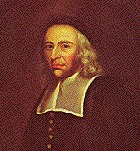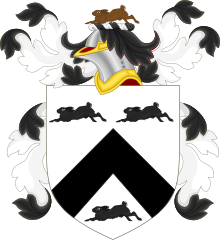| This biography needs additional citations for verification. Please help improve this article by adding citations to reliable sources in this biography. Unsourced material may be challenged and removed. Find sources: "John Leverett the Younger" – news · newspapers · books · scholar · JSTOR (September 2014) (Learn how and when to remove this message) |
| John Leverett | |
|---|---|
 | |
| President of Harvard College | |
| In office 1708–1724 | |
| Preceded by | Samuel Willard acting |
| Succeeded by | Benjamin Wadsworth |
| Personal details | |
| Born | (1662-08-25)August 25, 1662 Boston, Lincolnshire, Kingdom of England |
| Died | May 3, 1724(1724-05-03) (aged 61) Boston, Massachusetts Bay Colony, British America |
| Alma mater | Harvard College |
John Leverett (August 25, 1662 – May 3, 1724) was an early Anglo-American lawyer, politician, educator, and President of Harvard College.
Early life and education
Leverett was born on August 25, 1662, in Boston, Massachusetts Bay Colony, the son of Hudson Leverett, an attorney, and Sarah (Payton) Leverett, and grandson of John Leverett who was later the governor of the Massachusetts Bay Colony. He was educated at Boston Latin School and Harvard College, where he obtained a Bachelor of Arts in 1680 and a Master of Arts in 1683.
Career

For twelve years, Leverett was a resident fellow at Harvard. He was appointed in 1685 at the same time as William Brattle. Leverett and Brattle managed Harvard College while Harvard's President Increase Mather was in England for four years (1688–1692)
On November 25, 1697, Leverett married Margaret Rogers Berry, the daughter of former Harvard College president John Rogers. They had nine children, six of whom died in infancy. Margaret died on June 7, 1720. Leverett married secondly Sarah Crisp Harris. Sarah died on April 4, 1744.
John served in the Province of Massachusetts Bay as a justice of the peace (1699), a judge in the Court of Admiralty (1705), a justice of the Superior Court (1702–1708), judge of Probate Court for Middlesex County in Cambridge (1702–1708), legislator(1696–1702) and Speaker of the Colonial Massachusetts House of Representatives (1700–1702), and provincial councillor for eastern Maine (1706–1708).
Leverett acted as an Indian commissioner from Massachusetts during Queen Anne's War (1701–1713). He was unable to persuade the Iroquois to enter the war on the side of the British at a conference in 1704. Leverett raised and commanded a company of volunteers (as a lieutenant in the Military Company of Massachusetts, which he joined in 1704) in the failed assaults on French Port Royal, Acadia in 1707.
Leverett served as President of Harvard from January 14, 1708, until his death in 1724. In 1709, Leverett served as an emissary from Massachusetts Governor Joseph Dudley to New York Governor John Lovelace in negotiations for the establishment of military cooperation between Massachusetts and New York on the frontier and for an aborted invasion of Canada.
In 1719, Leverett helped to form the Lincolnshire Company which attempted to develop land in the Muscongus Patent in Maine, then part of Massachusetts. Leverett had inherited a share of this patent from his grandfather John Leverett. Nothing was accomplished and the grant was later taken over by Samuel Waldo, a Boston merchant.
He was elected a Fellow of the Royal Society in 1714.
Death
Leverett died in Boston, Massachusetts Bay Colony, on May 3, 1724, at age 61. He is interred in the Old Burying Ground, Cambridge, Massachusetts.
References
- ^ "Search past Fellows". Royal Society. Retrieved 23 January 2023.
External links
- Harvard University biographies of presidents, including John Leverett
- Inventory of John Leverett's Papers at Harvard University
- John Leverett the Younger at Find a Grave
| Legal offices | ||
|---|---|---|
| Preceded byElisha Cooke, Sr. | Associate Justice of the Massachusetts Superior Court of Judicature 1702–1708 |
Succeeded byJonathan Curwin |
| Academic offices | ||
| Preceded bySamuel Willard, acting | President of Harvard College 1708–1724 |
Succeeded byBenjamin Wadsworth |
| Presidents of Harvard University | |
|---|---|
| |
| – titled as the Schoolmaster; * indicates acting or interim president |